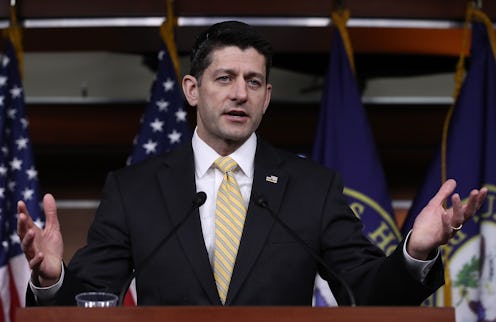
After weeks of promises, House Republicans have finally revealed their plan to repeal the Affordable Care Act with "American Health Care Act." The Obamacare replacement bill will affect health care premiums by resulting in both cheaper premiums for younger and healthier people and tax breaks for those from higher income backgrounds. But elderly and sicker people could experience higher premiums under the new legislation that has yet to be passed.
Frustration with health care is an understandable grievance in the United States; according to a POLITICO poll taken shortly after the election, repealing Obamacare was Republican voters' most primary concern and priority for Donald Trump's presidency. But there are definitely some valid concerns about the Republicans' new plan, which is wrought with many unanswered questions.
In an attempt to reduce the government's role in healthcare, the bill, for example, aims to undo the individual mandate requiring Americans to have health insurance or else get fined. It also plans to cut the number of people insured under Medicaid; in addition, the AHCA will allow insurance companies to charge seniors five times more than young people. Furthermore, the new piece of draft legislation will provide tax credits for the individual market, which proves to be advantageous for Americans from a higher income bracket.
And there are some other factors that could affect the premiums Americans pay for health insurance under the proposed system. In fact, the AHCA maintains that there will be a penalty for allowing healthcare to lapse. This penalty involves a 30 percent premium increase if an American's health insurance coverage lapses. This means that any lapse that goes on for more than 63 days will result in a higher premium.
In spite of Trump's many promises to provide healthcare for all Americans, the AHCA could very well leave more people without insurance. An analysis conducted by McKinsey, a worldwide management consulting firm, of a previous draft of the bill stated that it would result in millions of Americans without coverage.
It's also worth noting that the bill would also eliminate funding for Planned Parenthood — meaning that it will bar Medicaid from paying for medical services at the organization's clinics. Federal funding for abortions has been prohibited by the Hyde Amendment for over 30 years now. Women's health advocates say that the elimination of funding will target other medical services such as cervical cancer screenings, birth control, and mammograms too.
All in all, lots of questions related to the legislation's specifics will remain unanswered until the bill itself takes effect — if it is passed, of course.